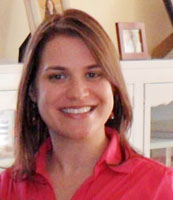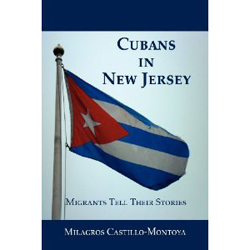New book gives voice to generations who created strong communities here
Successive waves of Cubans flowed into New Jersey from the 1950s through the 1980s, building intimate, vibrant communities in such cities as Elizabeth and Union. Now a Rutgers graduate has tracked their journeys in a new book, exploring not only their common immigrant experiences but also the differences that set one generation of newcomers apart from the next.
Cubans in New Jersey: Migrants Tell Their Stories, by Milagros Castillo-Montoya, published by the Newark Public Library, is the first in a series the New Jersey Hispanic Research and Information Center is developing to shed light on the Latino emigrant experience.
The Garden State is home to the second-largest Cuban community in the nation after Florida, but Cuban-Americans here are far from a monolithic group, says Castillo-Montoya, whose social history found that those who arrived during the 1950s and 1960s were from higher socioeconomic backgrounds and received greater financial assistance from the U.S. government than those who followed them.
“The people who came earlier were middle-class, not poor – many were highly educated bankers, lawyers, doctors. They had resources, although they could not bring a lot with them, and experienced a loss of income and status when they arrived here,” she says.
“Some of the families talked to me about being on government support but wanting quickly to get on their feet to make it on their own.”
The new arrivals from Castro’s Cuba during the 1980s faced a more sobering reality.
“Most of them came here poor, with fewer resources and less government aid,” says Castillo-Montoya, who received a bachelor’s degree in sociology from Rutgers in 1998 and a master’s degree from the Rutgers School of Social Work in 2001. She’s finishing her doctorate in education at Teachers College, Columbia University.

“Almost all of them had help from family members already here: They used items donated by family, almost all lived with relatives before getting their own apartment or home. For them, that family piece was really key. It was almost expected that you would arrive and your family would help you get on your feet, help you get your first job,” the researcher says.
Another commonality was the pull to form social and political clubs, places where the newcomers could dance together, play cards and dominoes and debate politics and ideology.
“Emotions run high when it comes to Cuban politics, because many of them had to start over after losing homes and businesses back home,” Castillo-Montoya notes. “It’s more so for the parents; the children raised here don’t think about Cuba in the same way.”
While her research for the book frequently prompts people to ask if she’s Cuban herself, Castillo-Montoya is Puerto Rican by birth, although her parents had lived at times in the New York-New Jersey area since the 1950s. But she grew up in Jersey City, near a flourishing Cuban community, eating Cuban food and playing with Cuban children.
In fact, she says, a bond exists between these two ethnic populations; many of the Cubans she interviewed expressed gratitude to their Puerto Rican neighbors for opening doors and lobbying successfully for bilingual education.
For her part, Castillo-Montoya says she is grateful to Rutgers for igniting the passion for research that has spurred her academic career. In particular, she cites the opportunity to participate in the Henry Rutgers Scholars Program and the Ronald E. McNair Postbaccalaureate Achievement Program at the university, which targets first-generation college students interested in pursuing doctorates.

Today, she says, the once-heavy Cuban influence in New Jersey is waning as other Latino immigrants – from Colombia, Ecuador, Peru – pour into the state and aging Cubans move to Florida or pass away.
“Towns that were heavily Cuban no longer are. You can see vestiges if you walk through: a Cuban bakery, a school named after a Cuban leader, a park dedicated to Cuban history,” she says. Moreover, the New Jersey native says, immigration from Cuba has virtually dried up. “It’s very, very hard to leave Cuba now.”
Milagros Castillo-Montoya will discuss her book Cubans in New Jersey: Migrants Tell Their Story at a presentation at 2 p.m. on December 1 at the Newark Public Library. For more information on the free program, which is part of the library’s 2012 Hispanic Heritage Celebration, call 973-733-7772, or visit http://www.npl.org/Pages/ProgramsExhibits/hh12/hh12.html.